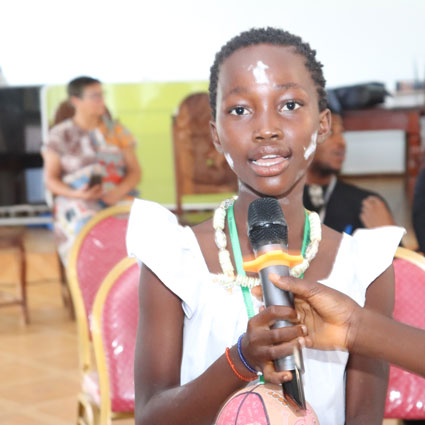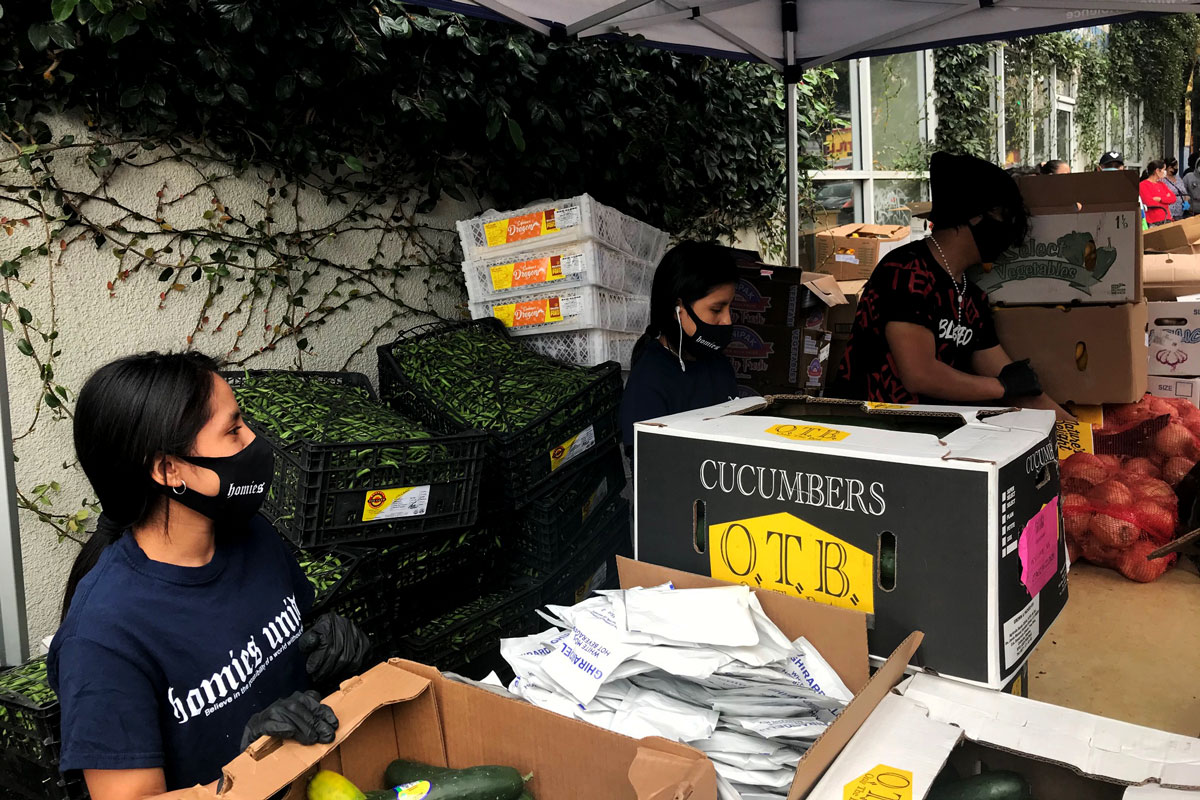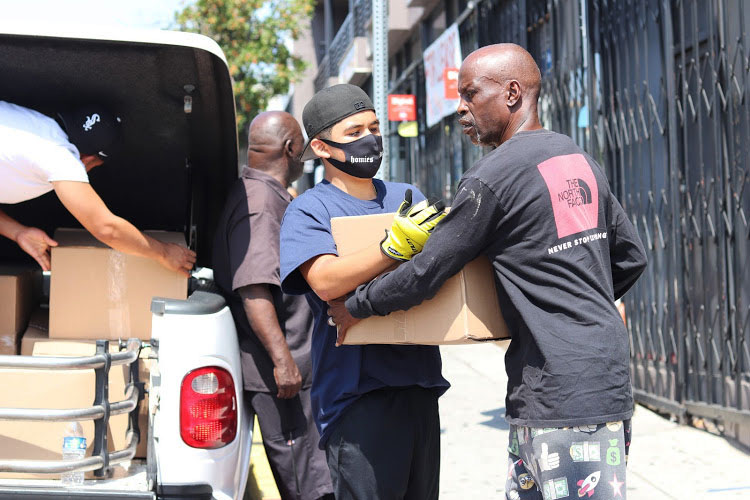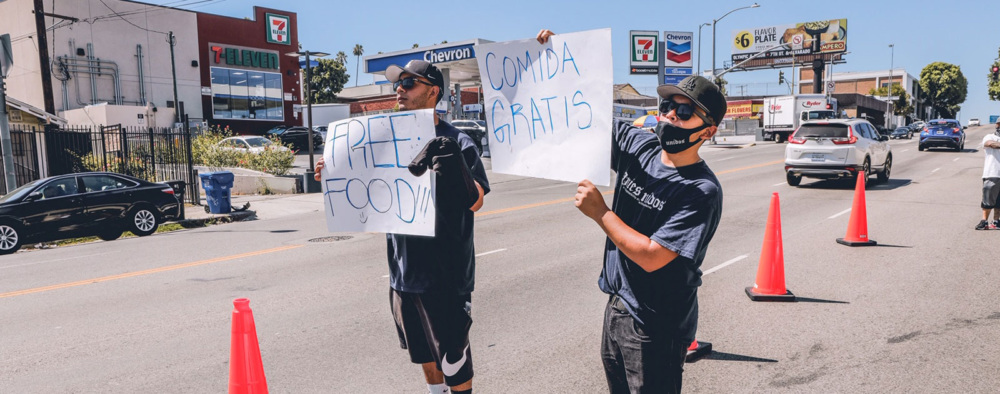
Education
Education, Youth power
This post was written by GFC’s Program Manager for Advocacy and Movement Building, Vanessa Stevens, and Homies Unidos’ Program Director Ana Minauri.
As soon as California’s stay-at-home orders went into effect in late March 2020, Los Angeles-based Homies Unidos sprang into action, assembling care packages with homemade burritos, snacks, hand sanitizer, and toilet paper, and delivering them to young people.
“We knew that members of our community would experience the financial crisis harder than most,” said Ana Minauri, the 25-year-old Program Director of GFC partner Homies Unidos. “Thinking of the unhoused young people in our neighborhood, I started making burritos and cooking up what would become our Community Response Initiative. The burritos were ugly, but good,” she added, laughing.
[image_caption caption=”Homies Unidos youth pass out food at a Community Response Initiative event. © Homies Unidos, Inc.” float=””]

[/image_caption]
Today, you can find Homies Unidos managing a humanitarian food distribution effort three days a week in communities across Los Angeles, including Koreatown, Rampart, Westlake, and South Central. Since the organization launched its COVID-19 response efforts, Homies Unidos has assembled a team of over 40 volunteers, including immigrant, at-risk, and formerly incarcerated youth and adults, to distribute free groceries and fresh produce to more than 5,000 families across Los Angeles.
Homies Unidos facilitates wellness, leadership development, and advocacy programs with youth and adults directly impacted by incarceration and immigration, including young people who recently migrated to the US. Participants include adolescent girls participating in the Xinacthli Rites of Passage program, which is supported by Global Fund for Children’s flexible funding through the Adolescent Girls and Migration initiative.
“Xinachtli” is a Nahuatl term meaning “seeds that germinate,” and the program’s risk-reduction curriculum is founded on the concept of healing through culture and self-awareness. The culturally relevant program creates a trauma-informed and healing-centered space for girls to explore identity, goal setting and planning, and leadership development. This program came to a halt during the pandemic when the stay-at-home order forced Homies Unidos to suspend all non-essential operations, including programming, community events, and its annual Central American Youth Leadership Conference.
[image_caption caption=”A Homies Unidos youth passes a pre-packaged box of food to a Black and Brown Alliance for Justice volunteer at a Community Response Initiative event. © Homies Unidos, Inc.” float=””]

[/image_caption]
Homies Unidos pivoted to what was essential: ensuring families in its community had food to weather the pandemic because many were losing their sources of income. Homies Unidos works with teen parents, single parents, undocumented and mixed-status households, formerly incarcerated individuals, and families of currently incarcerated individuals. The immigrant stronghold communities the organization serves were left behind – many families were ineligible for unemployment benefits or left out of the distribution of government stimulus funds. For the families facing the greatest hardships and a lack of transportation to come to the food drives, Homies Unidos assembled care packages and provided curbside delivery.
Ongoing community engagement has made Homies Unidos’ pandemic support program possible and profoundly impactful. Young people regularly volunteer at the food drives, which have also provided an opportunity to engage community members in discussions about important issues like tenant rights, census participation, and voting. Shortly before the pandemic, Homies Unidos co-founded the Black and Brown Alliance for Justice with other gang interventionists and peace builders in Los Angeles to strengthen racial justice and solidarity. As a coalition of Black and Brown community organizers, they now distribute food in communities impacted by gang violence and police brutality. By including young people and community members, Homies Unidos has turned its COVID-19 response efforts into a movement to “reduce violence by feeding our people,” as Alex Sanchez, the organization’s Executive Director, put it.
“When a mother thanks one of our young men, some of them with tattoos all over their face and body, and says ‘God bless you, mijo,’ it humanizes our young people who have been labeled gang members or criminals,” explained Alex. “It inspires them to continue building peace and become community leaders.”
Homies Unidos is preparing for the next phase of its response. The organization has been creative in transitioning some of its programs, including its work with adolescent migrant girls, to virtual platforms to maintain engagement with youth during the pandemic. Homies Unidos soon hopes to offer paid internship opportunities for youth to continue their involvement and leadership development by being on the ground, serving those in need. In spite of the many challenges the pandemic has presented, Homies Unidos has stayed true to its mission, empowering immigrant youth and families while building leaders within its community.
If you would like to support Homies Unidos, you can visit its website to make a tax-deductible donation. Stay up-to-date on the Community Response Initiative and other Homies Unidos activities by following the organization on Facebook and Instagram!
Header photo: Homies Unidos youth hold up “Free Food” signs at a Community Response Initiative event. © Alex Seyum, Carnival Pictures
